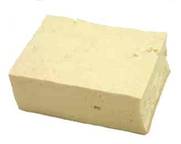|
SOYA SAUCE
Soya sauce is made by months of fermentation. Soya sauce is prepared in a variety of forms and is produced from a long and complex fermentation with various fungi and bacteria. Soyabeans are cooked for 4 or 6 hours and cooled. They are then mixed with an equal quantity of roasted ground wheat and the mixture, under suitable conditions, is seeded with Aspergillus oryzae. After the initial fermentation, salt is added and the product is matured for 6 months to 3 years when further fermentation occurs. When ripening is complete, the product is strained. Soya sauce thus obtained contains 67 percent moisture and 5 to 6 per cent protein.
OTHER PREPARATIONS FROM SOYABEAN
 Tempeh is prepared by cooking and skinning soyabeans inoculated with a little tempeh from the previous batch. The mixture is mashed and wrapped in banana leaves and allowed to ferment for 24 hours. Tempeh is prepared by cooking and skinning soyabeans inoculated with a little tempeh from the previous batch. The mixture is mashed and wrapped in banana leaves and allowed to ferment for 24 hours.
Natto is a Japanese product. The soyabeans are soaked in water cooked and inoculated with Bacillus subtilis or previously prepared Natto. They are then wrapped in barks of pines and are allowed to ferment under vacuum conditions at 40 for 20 hours. for 20 hours.
 Soyabeans can be sprouted, wet ground and added to cereal flour for the preparation of dosa, dhokla after fermentation. Soyabean meat food science is involved in the making foods that look and taste like meat but are made from soyabean proteins. If soyabean proteins are dissolved in alkali they form a sticky liquid. This liquid may be extracted through tiny holes and then recoagulated in an acid bath in the form of fibres. The fibres then can be spun into ropes with texture approaching the fibres texture of chicken or beef muscle tissue. The fabricated tissue then can be interlaced with fast-food flavorings and food colours. Products are almost indistinguishable from chicken meat, fish, hen or beef. This soyabean meat like products can be used by vegetarians and for patients with special dietary restrictions such as controlled levels of fat. Soyabeans can be sprouted, wet ground and added to cereal flour for the preparation of dosa, dhokla after fermentation. Soyabean meat food science is involved in the making foods that look and taste like meat but are made from soyabean proteins. If soyabean proteins are dissolved in alkali they form a sticky liquid. This liquid may be extracted through tiny holes and then recoagulated in an acid bath in the form of fibres. The fibres then can be spun into ropes with texture approaching the fibres texture of chicken or beef muscle tissue. The fabricated tissue then can be interlaced with fast-food flavorings and food colours. Products are almost indistinguishable from chicken meat, fish, hen or beef. This soyabean meat like products can be used by vegetarians and for patients with special dietary restrictions such as controlled levels of fat.
The following soy based products provide product variety for consumers. These are nutritious and have very good acceptability.
|


 Tempeh is prepared by cooking and skinning soyabeans inoculated with a little tempeh from the previous batch. The mixture is mashed and wrapped in banana leaves and allowed to ferment for 24 hours.
Tempeh is prepared by cooking and skinning soyabeans inoculated with a little tempeh from the previous batch. The mixture is mashed and wrapped in banana leaves and allowed to ferment for 24 hours. Soyabeans can be sprouted, wet ground and added to cereal flour for the preparation of dosa, dhokla after fermentation. Soyabean meat food science is involved in the making foods that look and taste like meat but are made from soyabean proteins. If soyabean proteins are dissolved in alkali they form a sticky liquid. This liquid may be extracted through tiny holes and then recoagulated in an acid bath in the form of fibres. The fibres then can be spun into ropes with texture approaching the fibres texture of chicken or beef muscle tissue. The fabricated tissue then can be interlaced with fast-food flavorings and food colours. Products are almost indistinguishable from chicken meat, fish, hen or beef. This soyabean meat like products can be used by vegetarians and for patients with special dietary restrictions such as controlled levels of fat.
Soyabeans can be sprouted, wet ground and added to cereal flour for the preparation of dosa, dhokla after fermentation. Soyabean meat food science is involved in the making foods that look and taste like meat but are made from soyabean proteins. If soyabean proteins are dissolved in alkali they form a sticky liquid. This liquid may be extracted through tiny holes and then recoagulated in an acid bath in the form of fibres. The fibres then can be spun into ropes with texture approaching the fibres texture of chicken or beef muscle tissue. The fabricated tissue then can be interlaced with fast-food flavorings and food colours. Products are almost indistinguishable from chicken meat, fish, hen or beef. This soyabean meat like products can be used by vegetarians and for patients with special dietary restrictions such as controlled levels of fat.